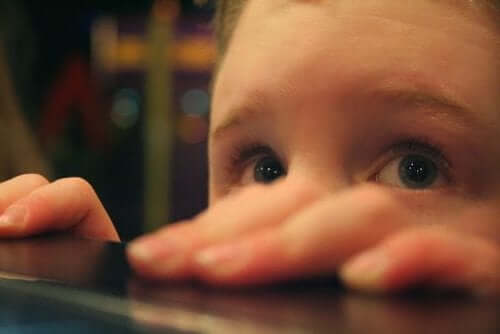What if My Child Self-Harms, What Do I Do?

There are situations in life that exceed our ability to cope, and that happens to all of us. It’s even something that can happen several times throughout life. In general, even if the situation exceeds our acceptable barrier, we develop new strategies to overcome it, and that’s how human beings become stronger. But when a person fails to develop extra strategies to overcome adversities, they resort to other less emotionally healthy ways. With that in mind, we want to tell you what you should do if your child self-harms.
How do children react to stress or emotional pain?
Children, in general, tend to react in very different ways. Some are more sensitive than others and also have different personal experiences. All this will influence their way of dealing with difficult situations. Some of the behaviors that we can find are:
- Sudden mood swings, become tearful or quick to anger.
- They look fearful.
- Loss of appetite.
- Having trouble sleeping.
- Alopecia (hair loss).
- Onychophagia (nail-biting).
- They have difficulty staying alert.
- The child self-harms

What does self-injury mean?
Self-injury has to do with voluntarily inflicting harm on oneself, and this produces a feeling of relief in the person suffering from the disorder. It can appear in children, adolescents, or adults, being more common in women and in the last two age groups. The type of lesions usually vary and include things like:
- Biting
- Cutting or scratching
- Burning
- Hitting themselves hard
- Marking the skin by applying pressure with objects
Unfortunately, this behavior has been on the rise in recent years. In fact, a study by the Journal of Psychopathology and Clinical Psychology showed that this behavior is seen in up to 28% of adolescents. So, if your child is self-injuring, pay attention to what we’ll tell you below.
Why do they do it?
A person who self-injures, whether they’re a child or an adult, usually does it in private as an expression of deep emotional pain that they haven’t been able to channel in any other way. Many people associate self-injury with suicide, however, it’s a way of relieving emotional distress at a particular moment.
In the case of children, it can occur in equal proportion in females and males and is usually a kind of silent cry for help and attention in a desperate way. When a child self-injures, the issue deserves immediate psychological attention. This is not the time for home approaches; it’s an emergency emotional situation.
Beyond knowing why your daughter or son is self-injuring, it’s even more important to identify when they’re doing it. However, this can be very difficult, as adolescents won’t explicitly tell you. In this regard, you’ll need to identify some of the following signs:
- Changes in behavior or attitude
- The presence of abnormal lesions that don’t heal, or worsen
- Suspicious scars
- Sudden isolation
- Multiple cuts in the same place
- Wearing many bandages
- Wearing long-sleeved clothing despite hot weather
What leads a child to self-injure?
If your child self-harms, they’re clearly going through a very hard situation and have found it difficult to deal with. It may be due to situations such as:
- Abrupt changes
- The death of a significant loved one
- Some type of abuse (physical, sexual, emotional)
- Low self-esteem
Some children also do it with the intention of getting attention or fitting into some group where this is a common practice, they take advantage of the emotional vulnerability of those who want to be part of the group and impose challenges such as self-injury to allow them to be a member. These conditions are no less serious than the ones we’ve mentioned above. All of them deserve specialized intervention because, in some way, they let you see that your child doesn’t have enough emotional strength to cope even with day-to-day social situations.
What to do if your child self-harms
- Make an appointment as soon as possible with a good psychologist who deals with the emotional aspects of human beings. There are social, educational, child, couple, and industrial psychologists. The range is wide, so make sure you choose the right professional.
- Check immediately what’s happening in your child’s life, try to uncover the cause, as this is essential.
- Adopt a warm attitude of understanding and affection for your child who needs you more than ever.
- Open communication with your child, let them feel free to talk to you, let your listening give them peace and security, whatever the reasons that led them to do this.

- You’re probably also immersed in the situation that led your child to self-injure, so provide psychological care for yourself as well. It’s essential that you recognize yourself humbly as a fallible mother, as we all are, with the possibility of making mistakes.
- Be totally sincere and transparent with the professional who will tend to them, don’t hold back information or provide half-truths. This will only delay your child’s improvement and yours as well.
- Be sure to respect your child’s privacy, avoid making comments with other people that make her feel exposed regarding something that’s painful for her.
- Be consistent to the end with the psychological treatment. Even if you see important changes and believe that everything has been overcome, keep your assistance constant until the specialist discharges them. Otherwise, they’ll have ample possibilities to relapse.
Every experience is a learning experience
We all want our children to learn only through wonderful and enriching experiences…if only that were the case. However, sometimes life presents us with situations that test us in every way, they’re events that are very unpleasant and mark our lives in a negative way, but we should take advantage of them in a positive way.
If this has been the case with your daughter or son, besides accompanying them in their recovery process, teach them that every experience is a learning experience, support them so they can come out stronger from this chapter in their life so that it’s just that, a bad chapter and not the whole novel.
Learn together about what led them to this point so that they never go through it again. That’s what life is all about: Growing through adversity.
There are situations in life that exceed our ability to cope, and that happens to all of us. It’s even something that can happen several times throughout life. In general, even if the situation exceeds our acceptable barrier, we develop new strategies to overcome it, and that’s how human beings become stronger. But when a person fails to develop extra strategies to overcome adversities, they resort to other less emotionally healthy ways. With that in mind, we want to tell you what you should do if your child self-harms.
How do children react to stress or emotional pain?
Children, in general, tend to react in very different ways. Some are more sensitive than others and also have different personal experiences. All this will influence their way of dealing with difficult situations. Some of the behaviors that we can find are:
- Sudden mood swings, become tearful or quick to anger.
- They look fearful.
- Loss of appetite.
- Having trouble sleeping.
- Alopecia (hair loss).
- Onychophagia (nail-biting).
- They have difficulty staying alert.
- The child self-harms

What does self-injury mean?
Self-injury has to do with voluntarily inflicting harm on oneself, and this produces a feeling of relief in the person suffering from the disorder. It can appear in children, adolescents, or adults, being more common in women and in the last two age groups. The type of lesions usually vary and include things like:
- Biting
- Cutting or scratching
- Burning
- Hitting themselves hard
- Marking the skin by applying pressure with objects
Unfortunately, this behavior has been on the rise in recent years. In fact, a study by the Journal of Psychopathology and Clinical Psychology showed that this behavior is seen in up to 28% of adolescents. So, if your child is self-injuring, pay attention to what we’ll tell you below.
Why do they do it?
A person who self-injures, whether they’re a child or an adult, usually does it in private as an expression of deep emotional pain that they haven’t been able to channel in any other way. Many people associate self-injury with suicide, however, it’s a way of relieving emotional distress at a particular moment.
In the case of children, it can occur in equal proportion in females and males and is usually a kind of silent cry for help and attention in a desperate way. When a child self-injures, the issue deserves immediate psychological attention. This is not the time for home approaches; it’s an emergency emotional situation.
Beyond knowing why your daughter or son is self-injuring, it’s even more important to identify when they’re doing it. However, this can be very difficult, as adolescents won’t explicitly tell you. In this regard, you’ll need to identify some of the following signs:
- Changes in behavior or attitude
- The presence of abnormal lesions that don’t heal, or worsen
- Suspicious scars
- Sudden isolation
- Multiple cuts in the same place
- Wearing many bandages
- Wearing long-sleeved clothing despite hot weather
What leads a child to self-injure?
If your child self-harms, they’re clearly going through a very hard situation and have found it difficult to deal with. It may be due to situations such as:
- Abrupt changes
- The death of a significant loved one
- Some type of abuse (physical, sexual, emotional)
- Low self-esteem
Some children also do it with the intention of getting attention or fitting into some group where this is a common practice, they take advantage of the emotional vulnerability of those who want to be part of the group and impose challenges such as self-injury to allow them to be a member. These conditions are no less serious than the ones we’ve mentioned above. All of them deserve specialized intervention because, in some way, they let you see that your child doesn’t have enough emotional strength to cope even with day-to-day social situations.
What to do if your child self-harms
- Make an appointment as soon as possible with a good psychologist who deals with the emotional aspects of human beings. There are social, educational, child, couple, and industrial psychologists. The range is wide, so make sure you choose the right professional.
- Check immediately what’s happening in your child’s life, try to uncover the cause, as this is essential.
- Adopt a warm attitude of understanding and affection for your child who needs you more than ever.
- Open communication with your child, let them feel free to talk to you, let your listening give them peace and security, whatever the reasons that led them to do this.

- You’re probably also immersed in the situation that led your child to self-injure, so provide psychological care for yourself as well. It’s essential that you recognize yourself humbly as a fallible mother, as we all are, with the possibility of making mistakes.
- Be totally sincere and transparent with the professional who will tend to them, don’t hold back information or provide half-truths. This will only delay your child’s improvement and yours as well.
- Be sure to respect your child’s privacy, avoid making comments with other people that make her feel exposed regarding something that’s painful for her.
- Be consistent to the end with the psychological treatment. Even if you see important changes and believe that everything has been overcome, keep your assistance constant until the specialist discharges them. Otherwise, they’ll have ample possibilities to relapse.
Every experience is a learning experience
We all want our children to learn only through wonderful and enriching experiences…if only that were the case. However, sometimes life presents us with situations that test us in every way, they’re events that are very unpleasant and mark our lives in a negative way, but we should take advantage of them in a positive way.
If this has been the case with your daughter or son, besides accompanying them in their recovery process, teach them that every experience is a learning experience, support them so they can come out stronger from this chapter in their life so that it’s just that, a bad chapter and not the whole novel.
Learn together about what led them to this point so that they never go through it again. That’s what life is all about: Growing through adversity.
This text is provided for informational purposes only and does not replace consultation with a professional. If in doubt, consult your specialist.








